Resilience, recovery, relevance: how Africa is accelerating digital transformation for socio-economic impact
At an unprecedented ‘physical’ event in the pandemic era, business leaders and policymakers identified key levers for digital impact in Africa.
With the theme Accelerating National ICT Agendas, the 18th annual edition of the Innovation Africa Digital Summit (IADS) 2021 was recently held in Addis Ababa. Organised by Extensia, this premier conference in Ethiopia was one of the only major international ICT events held ‘physically’ in Africa this year.
With due safety measures and protocols in place, the conference drew 284 attendees from 25 countries, including 15 African countries. The lineup of 55 speakers shared authoritative insights across 20 sessions, with keynotes, panels, and solutions showcases.
As conference chair, here are my key takeaways on the main themes of the packed two-day event. See also my earlier conference coverage of IADS in 2019, 2018, 2017, 2016, 2015, and 2014, as well as the Youth Engagement Summit.
The session topics were in four thematic clusters: technology (eg. 5G, future-proofing networks), business models (eg. on-demand SaaS, PaaS), user experience (eg. relevance, desirability), and policy (eg. investment attractiveness, ecosystem partnerships).
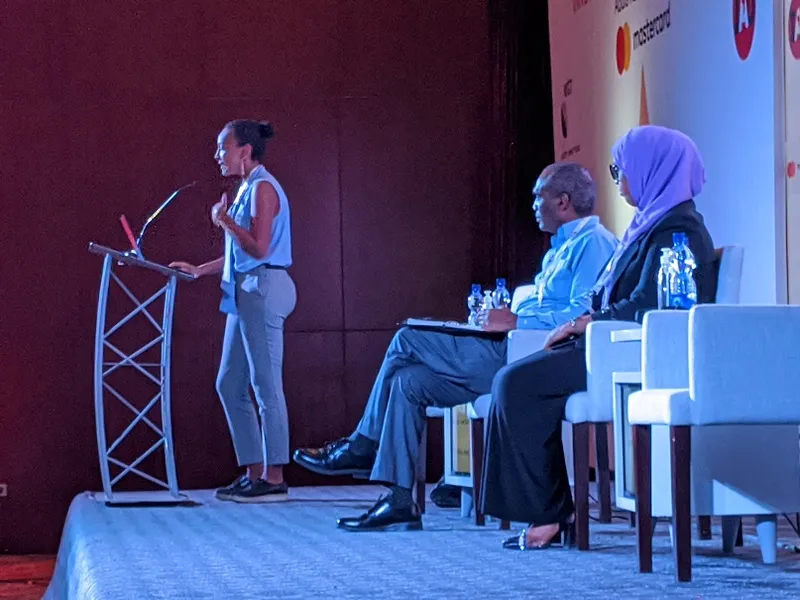
Panel: Africa Rising
Digital infrastructure
The panel provocatively titled Africa Rising highlighted the progress Africa has made in ICT diffusion and adoption, while also acknowledging the real challenges ahead.
Dawit Bekele, Regional Vice President – Africa, Internet Society contrasted the 0.5 percent of telephone penetration in Sub-Saharan Africa in the year 2000, with 46 percent mobile penetration in 2020.
Africa’s gap with Europe in Internet penetration has narrowed from 20 times in 2005 to 2.2 times in 2020, according to cited data. Venture capital grew from around $200 million in 2015 to $2 billion in 2019.
Bekele indicated that Africa’s youth dividend and connectivity levels are sufficient to sustain digital innovation, which can be scaled up even more with a better legal and regulatory environment.
Pravin Udho, Managing Sales Director, Intelsat, explained how space-based satellite networks will play a major role in the 5G ecosystem in Africa. The company already serves seven of the world’s top 10 mobile network operators.
He cited data which forecasts that by the end of 2026, Sub-Saharan Africa will have around 70 million 5G subscriptions. In Africa, 5G networks have been officially deployed in a range of countries, including Madagascar, South Africa, and Kenya. Tests and plans are under way in other countries such as Nigeria, Tanzania, Ethiopia, and Cameroon.
5G use cases range from enhanced mobile broadband to machine-type communications. Satellites help in this regard via ubiquity, redundancy, and resiliency. They also help rural broadband expansion. The role of satellites was reinforced by speakers from Hughes Network Systems and Nokia/Vodafone.
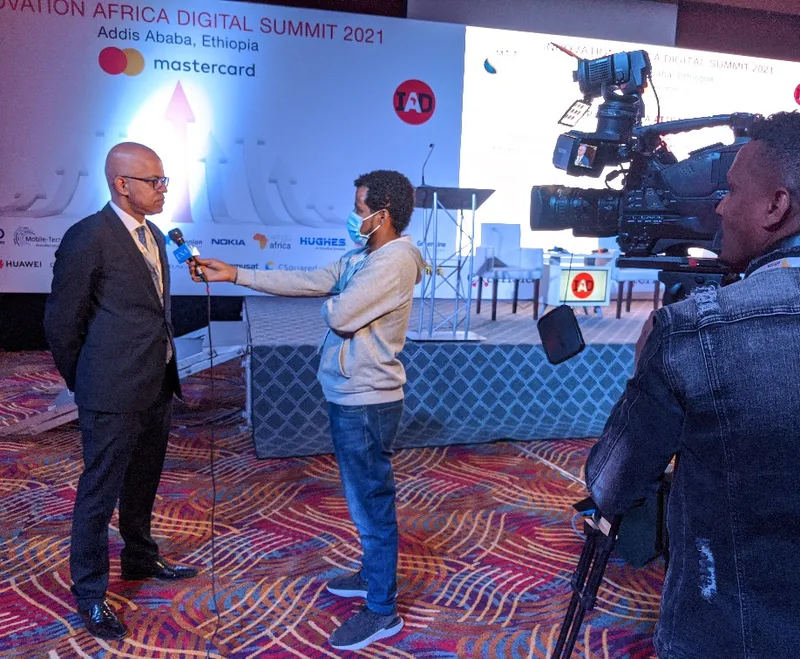
Tariq Malik (L), CEO, Extensia
Chen Yi Hui, CTO SAA, ZTE highlighted two types of digital divide: coverage and experience. He explained the different coverage types: continuous, linear, spot, rural, and remote. 5G enables superior network quality for home broadband access, and can spur a range of innovative applications across sectors.
Successive waves of mobile communication technologies constitute not just a ‘vertical’ industry in their own right but also a core ‘horizontal’ platform for other sectors. Mobile networks are key enablers in this regard, according to Anwar Soussa, CEO, Safaricom Ethiopia.
The operator was recently awarded a mobile communications license for the lucrative Ethiopian market. Competition in a market leads to better innovation, more effective solutions, and overall fast-tracking of the economy, according to Soussa.
Solutions: products and services
A range of tech leaders presented solutions for data, bandwidth, security, and power. For example, Wingu.Africa has developed a range of data ecosystem solutions. Starting off with data centres in Djibouti, it now has facilities in Addis Ababa, Adama, Bahir Dar, Dar Es Salam, and Somaliland as well.
Bandwidth and Cloud Services Group (BCS) has developed wholesale telecom infrastructure solutions for East, Central and Southern Africa. These include wholesale internet (IP transit), Direct Internet Access (DIA), and International Private Leased Line Circuit (IPLC).
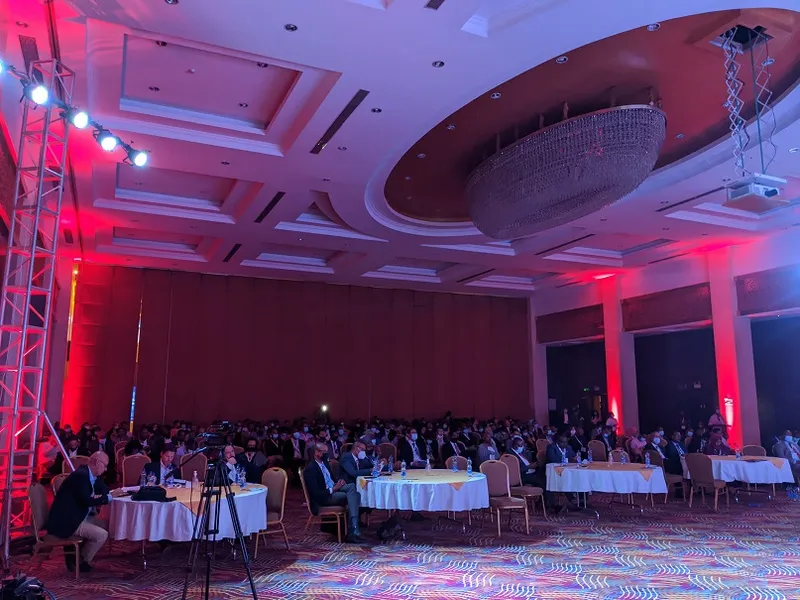
CSquared is a wholesale, open-access FTTx provider with the stability to layer on technologies and services enabled by fiber (eg. WiFi, small cells). It is present in a number of countries including Uganda, Ghana, Liberia and Kenya.
Increasing use of digital technologies opens the door to risks as well. ICT solutions provider Octopian has developed a range of offerings in this regard, including qualitative and quantitative risk management for better cybersecurity.
An intelligent digital identity management system can help build robust, consistent, and secure experiences for KYC solutions, according to Edwin Oendo, Sales Director – Africa, Mobile Technologies. Use cases include customer registration for telcos, camera surveillance for smart cities, e-KYC for banking, smart check-in for transportation, and digital identity for e-health.
DPA’s clean, secure, and affordable energy solutions can be leveraged by data centres and telecom towers. Helios Towers advocates the use of independent tower companies, which can ultimately help telcos increase the subscriber base with lower prices and better quality.
Ecosystem linkages
The importance of ecosystem partnerships was highlighted by Yonas Anulo, Huawei’s MKT Expert. The company has collaborated for joint innovation with Ethio Telecom’s software test lab, and for academic and CSR initiatives as well.
The project portfolio spans support for a light rail network as well as mobile money. Infrastructure, innovation, and talent together can boost the digital ecosystem, eg. for cloud-based rural digital centres for agriculture and education.
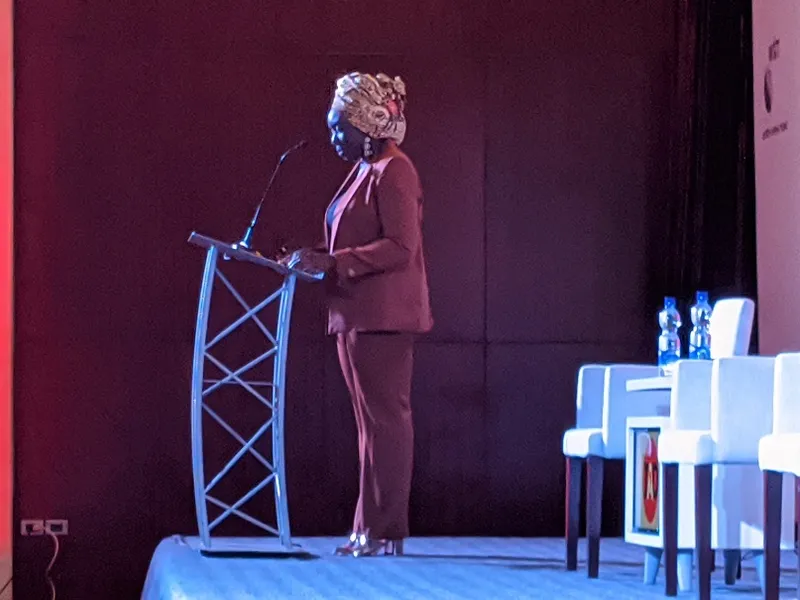
Magassa Hatoumata, Orange Digital Center, Ethiopia
Magassa Hatoumata, Country Director - Orange Digital Center, Ethiopia, emphasised that digital outcomes depend on practical steps for driving digital skills development. Such tech skills promote job creation, innovative startups, and a long-term entrepreneurial culture.
Orange runs programmes for women, youth, and children for developing skillsets and mindsets for digital innovation. This includes makerspaces and inclusive apps, with initiatives such as a Coding School, Fab Lab, and venture investments.
A range of projects were showcased, such as an Amharic speech-to-text convertor on mobiles, and a smart irrigation system. Hatoumata called for more cross-sectoral partnerships, up-to-date trainings, inclusive funding, and embedding of digital skills in formal education.
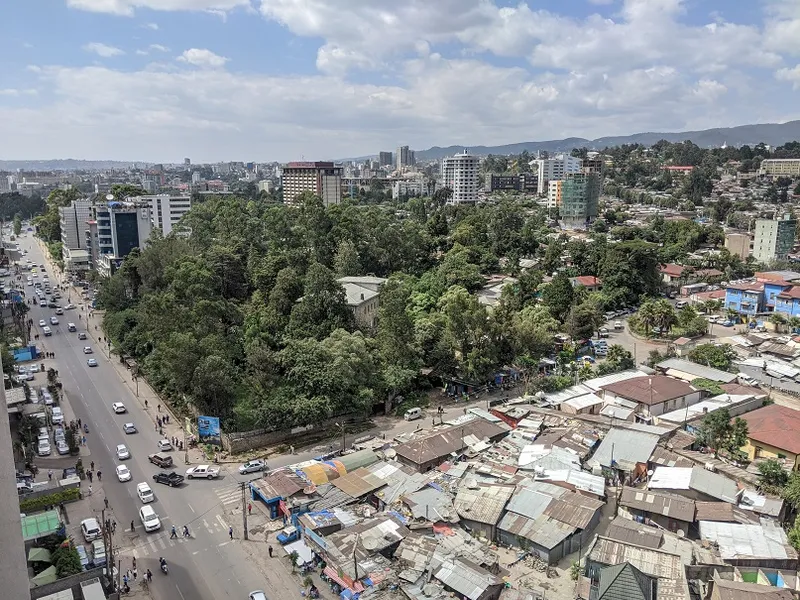
Addis Ababa
Impacts
The power of digital technology for business and social impact has been ably demonstrated by the fintech sector. Players such as banks, mobile operators and fintech startups are core parts of this emerging ecosystem.
A range of speakers showed how the pandemic boosted the demand for digital payment solutions, which led to further insights for sectors like lending and insurance. For example, M-Pesa has been credited with lifting roughly 2 percent of Kenyan households out of extreme poverty, and increasing access to financial services and products by around 56 percent between 2006 and 2019, according to data cited by Safaricom Kenya.
Support for microfinance holds the key to broader socio-economic opportunity, as emphasised by Elfagid Woldegiorgis, Business Development Director - East Africa, Mastercard.
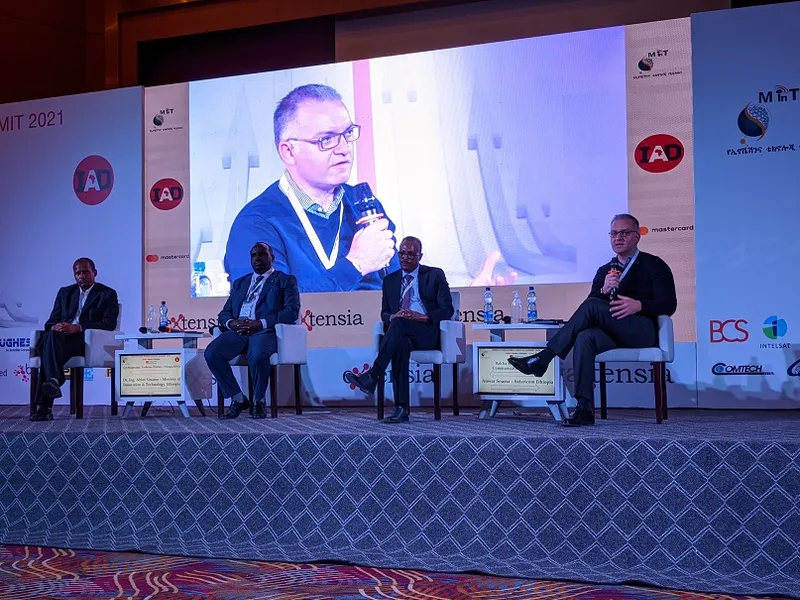
Panel: Ethiopia Future Vision
High speed connectivity can accelerate economic transformation, but readiness and relevance challenges are still critical, according to Fargani Tambeayuk, Head of Connectivity Policy, Africa, Facebook.
The internet has become vital for education and livelihood support, and many of the African Development Bank’s priority areas for transforming Africa are dependent on high-speed connectivity. More innovation is needed in areas like spectrum policy and community broadband networks via approaches like regulatory sandboxes, Tambeayuk explained.
Business model innovation can enable service providers to share resources and bring down the costs of deploying and operating networks. More unlicensed or shared spectrum also enables further digital adoption, he added.
Commitments to improving social inclusion in Ethiopia via ICTs were reinforced by Matthew Harrison-Harvey, Chief External Affairs and Regulatory Officer, Safaricom Ethiopia. Case studies of mobile impacts in African countries like Mozambique were shared by Pedro Rabacal, CTIO, Safaricom Ethiopia.
Sinit Zeru, Senior Advisor - Digital Transformation, Tony Blair Institute, called for greater focus on serving the needs of the underprivileged and disenfranchised. Innovation should go beyond ‘shiny objects’ and focus on real needs and aspirations of target communities.
Even seemingly ‘boring’ areas hold the key to economic transformation. But regulators need to up their game when it comes to mastering the rules of digital ecosystems.
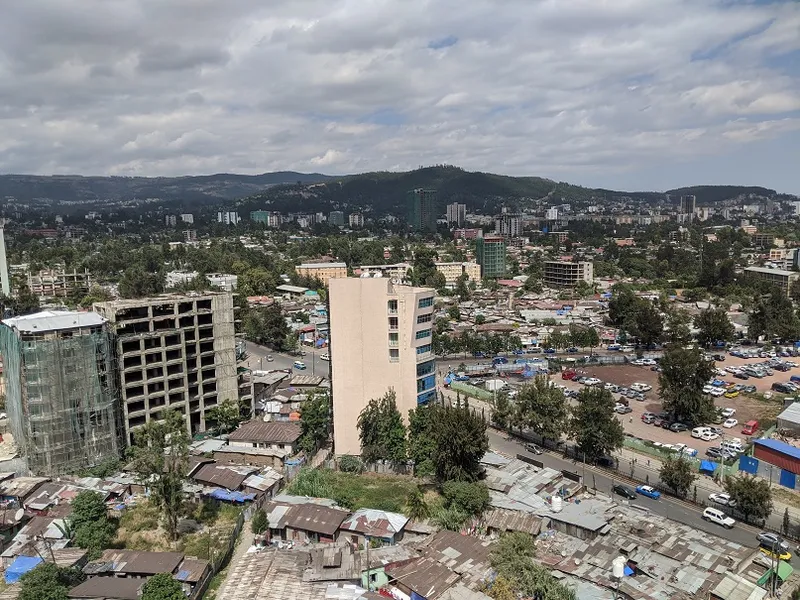
Addis Ababa
Policy
Ethiopia’s commitment to national ICT acceleration was showcased by a high-power lineup of speakers: Belete Mola, Minister of Innovation and Technology, and Huria Ali, State Minister at Ministry of Innovation and Technology (MiNT).
Other panels featured Dr.-Ing. Abiot Sinamo, DG ICT Sector, MiNT, and Balcha Reba, Director General, Ethiopian Communications Authority. International speakers with a policy focus included Amina Hussein, Director General, Ministry of ICT – Somaliland.
The experts urged cooperation not just in the public-private realm, but also between private sector players such as mobile operators. Academic and research institutes are key partners in capacity building for regulators as well.
African countries like Ethiopia are at a pivotal point where the young and burgeoning population is fueled with a passion for a digital future, according to Matthew Harrison-Harvey of Safaricom.
Lanre Kolade, Group CEO, Csquared, urged policymakers to reduce cross-border barriers, develop holistic and integrated perspectives, and promote infrastructure sharing. Though data volumes are lower in Africa as compared to other parts of the world, internet usage in the region continues to increase.
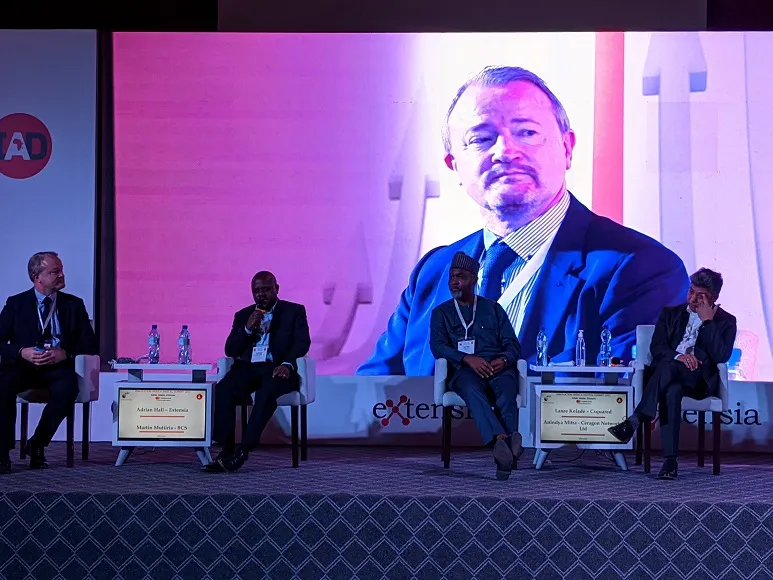
Panel: Future-Proof Networks
Key messages
Key messages underling each of these thematic clusters were the importance of resilience (in the wake of the global COVID-19 pandemic), empathy (for affected end-users and small businesses), and digital transformation (of private and public sectors). Specific case studies covered vertical sectors like education, healthcare, and fintech.
The pandemic has accelerated the pace of digital transformation and highlighted the role of digital infrastructure for economic recovery and resilience. With great opportunity comes greater responsibility, which extends to inclusion, sustainability, and creativity in use of ICTs.
In sum, the ICT sector in Africa continues to make real progress as measured by a range of metrics, with much more opportunity in the years to come. Future events by Extensia and its pan-African community of digital leaders will continue to set the stage for such critical developments.
Edited by Anju Narayanan












